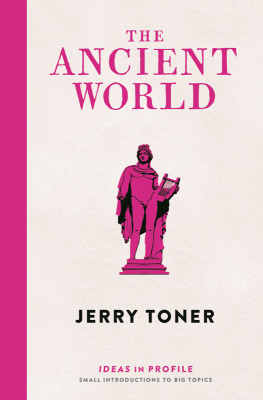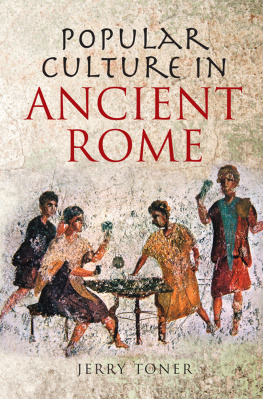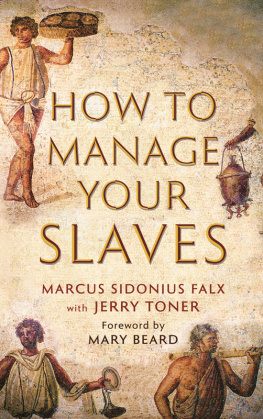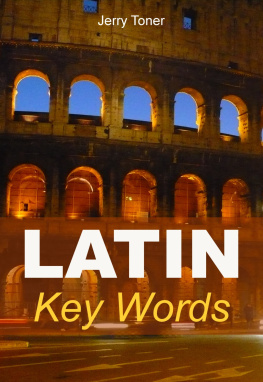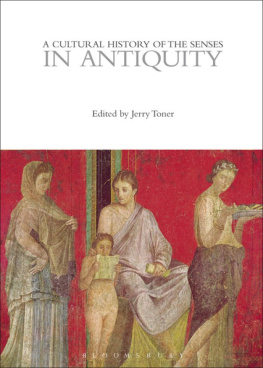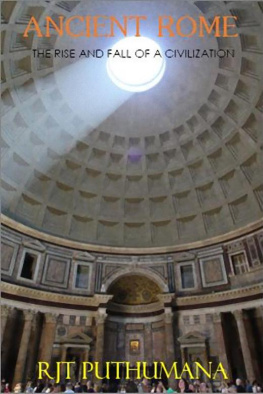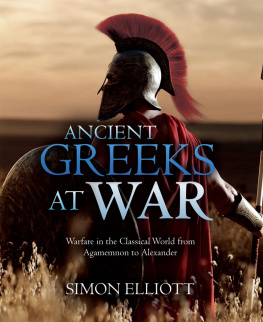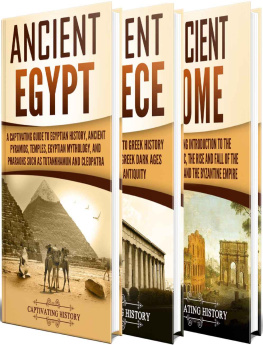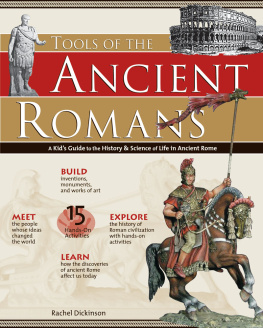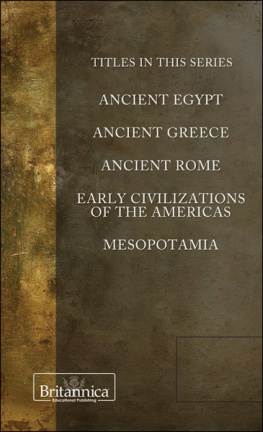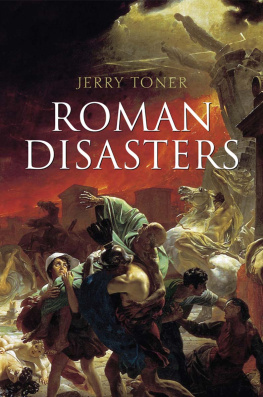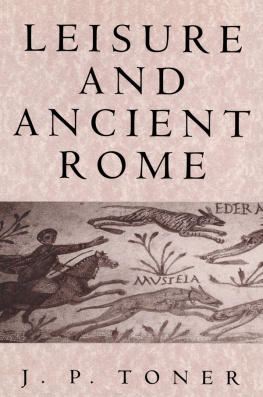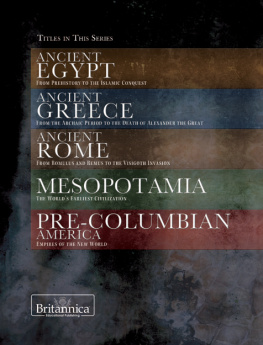THE ANCIENT WORLD
Jerry Toner is Fellow and Director of Studies in Classics at Churchill College, Cambridge. He is the scholar behind Marcus Sidonius Falxs How to Manage your Slaves (Profile 2014) and Popular Culture in Ancient Rome (Polity Press 2009).
IDEAS IN PROFILE
SMALL INTRODUCTIONS TO BIG TOPICS
ALSO BY JERRY TONER
Popular Culture in Ancient Rome
Homers Turk: How Classics Shaped Ideas of the East
Roman Disasters
How to Manage your Slaves, by Marcus Sidonius Falx
The Day Commodus Killed a Rhino:
Understanding the Roman Games
THE
ANCIENT
WORLD
JERRY TONER

First published in Great Britain in 2015 by
PROFILE BOOKS LTD
3 Holford Yard
Bevin Way
London WC1X 9HD
www.profilebooks.com
Copyright Jerry Toner 2015
Designed by Jade Design www.jadedesign.co.uk
Maps by Martin Lubikowski, ML Design
www.facebook.com/makingmapswork
The moral right of the author has been asserted.
All rights reserved. Without limiting the rights under copyright reserved above, no part of this publication may be reproduced, stored or introduced into a retrieval system, or transmitted, in any form or by any means (electronic, mechanical, photocopying, recording or otherwise), without the prior written permission of both the copyright holder and the publisher of this book.
All reasonable efforts have been made to obtain copyright permissions where required. Any omissions and errors of attribution are unintentional and will, if notified in writing to the publisher, be corrected in future printings.
A CIP catalogue record for this book is available from the British Library.
eISBN 978 1 78283 141 9
ANOTHER ANCIENT WORLD
What was it like to walk through Rome? Rome: the imperial city of a million people, bigger than any western city until the industrial revolution. What would we have seen? Gleaming white classical temples and toga-clad Romans? Cicero delivering his speeches in the forum? Or if we strolled through Athens would we have found Socrates goading the other Athenians by pointing out the errors in their logic? Would we have been able to take our eyes off the glory of the Parthenon? This book has no intention of introducing you to these hackneyed images of the ancient past.
Imagine an alternative ancient world. What do we encounter as we stroll through an ancient city? For a start, our senses get a totally different experience. The stench from garbage and human excrement hits us hard. For all the Romans impressive developments in sewers, these are confined to the main public areas in the city. Away from them, people dump wherever they can. The citys slaves and manual labourers clear away some of this waste and take it to pits outside the city walls. But the smell still permeates the air.
Death fills the air too. Many of the homeless die in the street. Even emperors can be affected by this. Vespasian was once having his dinner when a dog ran in from the street and dropped a human hand under the table. This is a pre-industrial world where attitudes to waste and physical remains are different to ours. That does not mean that the ancients take no care with dead bodies. Far from it. Like the heroes of the Iliad, they are desperate to have a proper burial, even if this means simply a handful of dust thrown over their corpse. In Rome, where cremation is the more usual form of disposal, bodies are taken outside the city limits and burnt on simple pyres. A city of Romes size produces a steady supply of the dead. Perhaps a hundred per day were incinerated along the roads that led into the city. The smell of burning flesh welcomes the traveller to the grim realities of life in an ancient town.
Tourists visiting the sights of the ancient world today generally adopt the reverent hushed tones reserved for places of worship. In the Colosseum, visitors stand quietly out of respect for the many thousands who perished there. Theres nothing wrong with this. It makes us think about how different the past was. It shows that it matters to us not to disrespect these long-dead people. But it gives us a very false sense of what it was like to live in these places. The noise could be deafening. The cheers of the crowd in the amphitheatre and the Circus Maximus, where about a quarter of a million spectators could squeeze in, rang out over the city. Wooden carts clattered over the stone streets, hawkers shouted out to advertise their wares using distinct types of cry depending on what they were selling, and drovers herded the thousands of animals needed to help feed the city to the butchers who slaughtered them.
Many things were not as they now seem. We gaze at the cool, white marble of the ancient statues of the Parthenon and its simplicity symbolises the purity of the ancient world. The Greeks were the people who invented reason and science, who were able to look beneath the surface appearance of things and understand them for what they were. In fact, most if not all ancient statues were painted. Or they were gilded or glazed or varnished. The main features of the face were highlighted to make them stand out for the viewer. Eyes were painted white or inset with coloured glass to make them as lifelike as possible. Lips were exaggerated with dramatic reds like some ancient form of collagen implanting. And the more important the statue, the bolder and more expensive the colouring. Red cinnabars and Egyptian blues, for example, were used to give a sense of the divine power of a godlike emperor. If you see a mock-up of how an ancient statue actually looked, its hard today not to regard it as garish. Contemporaries would have seen it as close to divine reality. This just shows how difficult it is to view the ancient world as they did. We have become so accustomed to this world through films, paintings or neoclassical architecture that we may be tempted to believe that if we went there in a time machine wed feel pretty much at home. If Im going to do one thing in this short book, it will be to challenge this sense of familiarity.
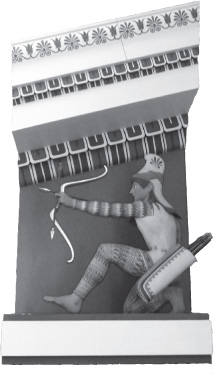
A painted reconstruction of a statue from the Temple of Aphaea on Aegina
As the multicoloured statue makes clear, if we went back to the ancient world we wouldnt even be able to trust our senses. We have learnt to see things in certain ways. We might hear the same noises as the ancient locals but we would understand them differently. Smells that would disgust us were quite normal in the ancient world we would have to completely retrain our senses before we could even begin to experience it in the same way as its inhabitants.
We imagine that we experience the senses as five separate phenomena, each with its own particular characteristics. But the ancients mixed up the senses to create a complex and overlapping descriptive palette. Homers famous image of the wine-dark sea related not just to its colour but also to its sharp, pungent taste and smell. Perhaps it hinted at what being at sea felt like the woozy feeling of having drunk too much. The idea of tasting, smelling and feeling colours is not something we easily understand. Even reading was a varied sensory activity. Texts were designed not just to be read but also to be heard, partly because literacy levels were low. It seemed natural to taste, hear and smell what to us might appear as purely visual descriptions. Good writing allowed the audience to experience by means of words.
Just how low literacy levels were is unclear. Perhaps as few as five per cent of the population were functionally literate, meaning they knew enough words to be able to communicate in a simple written form or read basic texts. The numbers who could read the literature of high culture were even smaller: a couple of per cent at most. Education was expensive and most people needed to get their children working at a young age. A lot of what we regard as classical culture is the high culture of this small group of the rich. Only the wealthy could afford to idle their time away in reading poetry or learning the finer points of prose composition. In fact, it was the very uselessness of such activities that made them attractive to the upper classes in society, in the same way that learning Latin often does today. This doesnt mean that no one else in society could enjoy good poetry. Both Homer and Virgil could be widely appreciated precisely because they were designed to be read out loud. Public performances, whether in the formal environment of the stage or more informal recitations in the forum, were popular. Nor does it mean that the classics of literature, which form the core of a traditional Classics course, are any less valuable or worth studying. But it does mean that if we want to get a clearer picture of the ancient world as a whole we need to expand our horizons significantly away from this highly literate group.
Next page
